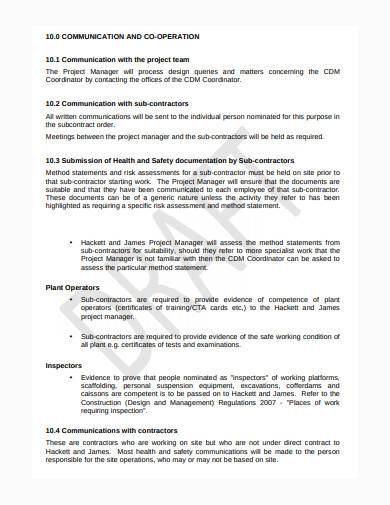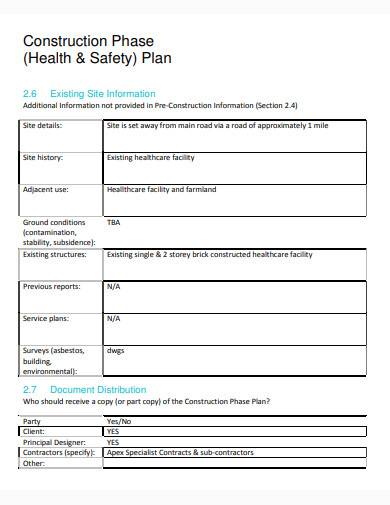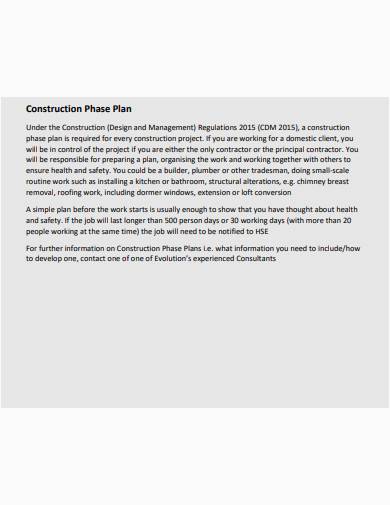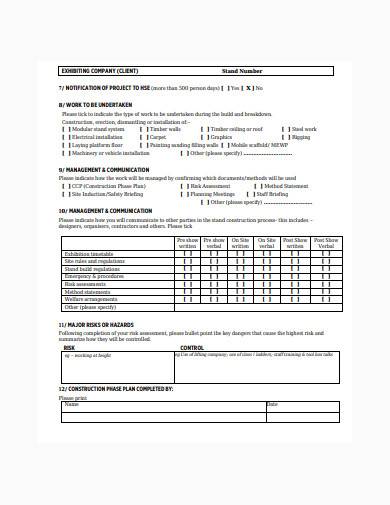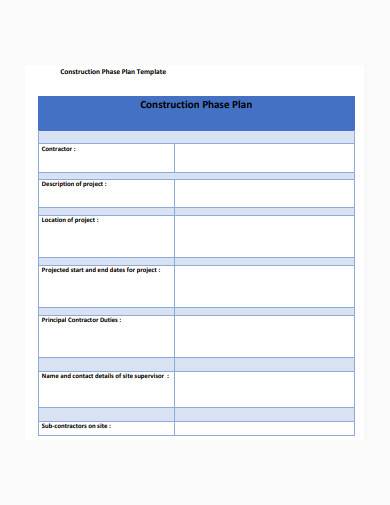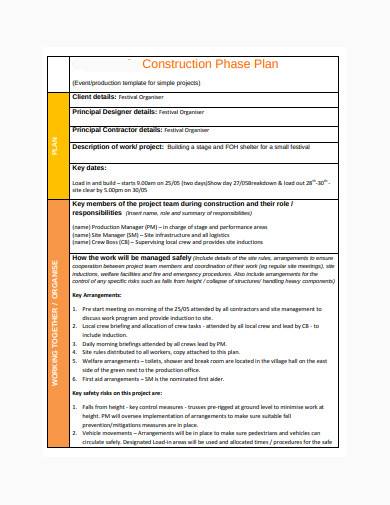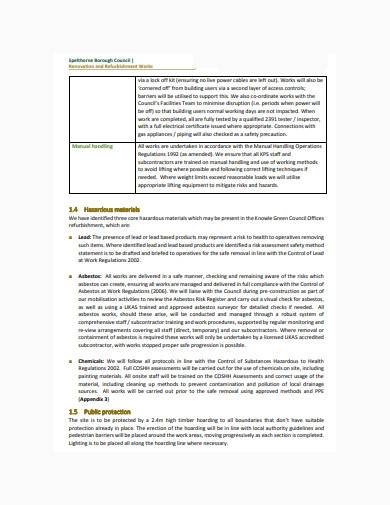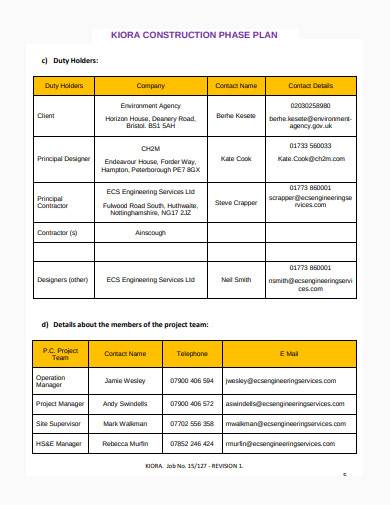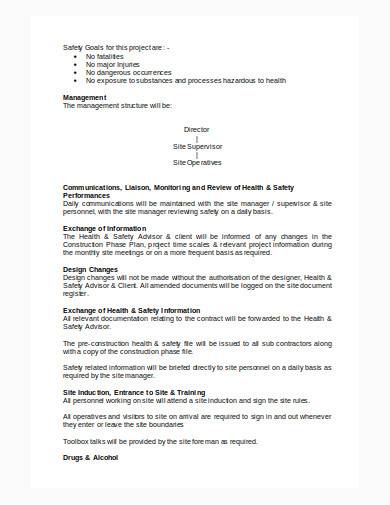Here is the scene: one of your crew members is welding a scaffold beam onto the main structure. It seems pretty standard, correct? Unfortunately, he’s 15-feet above the ground with no harness and wearing only flipflops due to lack off risk management and supplies. Hence, when he fidgets because sparks touched his toes, he loses his balance and falls. This leads to a body on the pavement, and you under lawsuits. The moral lesson of this “parable”? Never skimp out on risk protocols and safety gear just to save a few dollars.
Construction Phase Plan Template
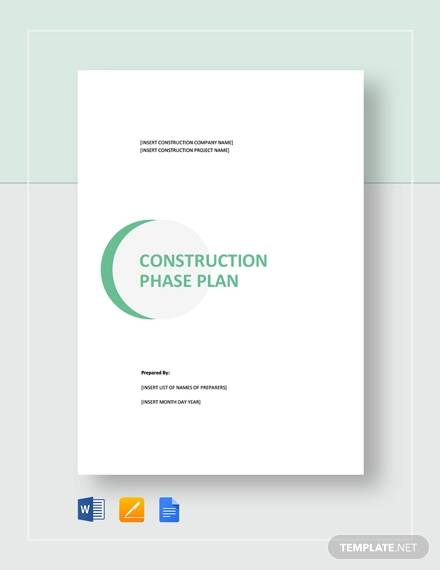
Small Construction Phase Plan Template
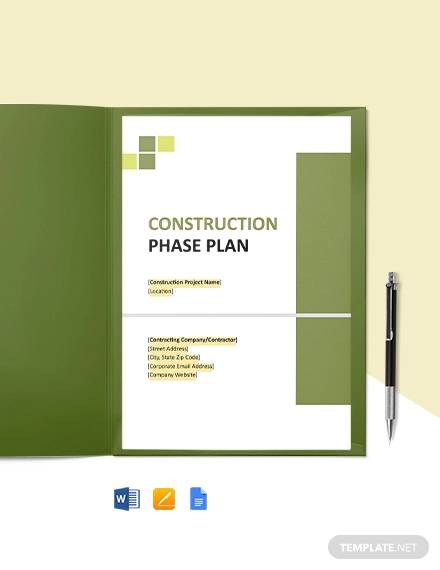
Pre Construction Phase Plan Template
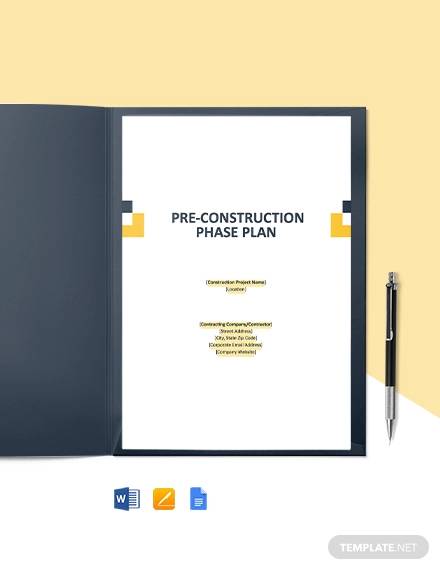
Free Basic Construction Phase Plan Template
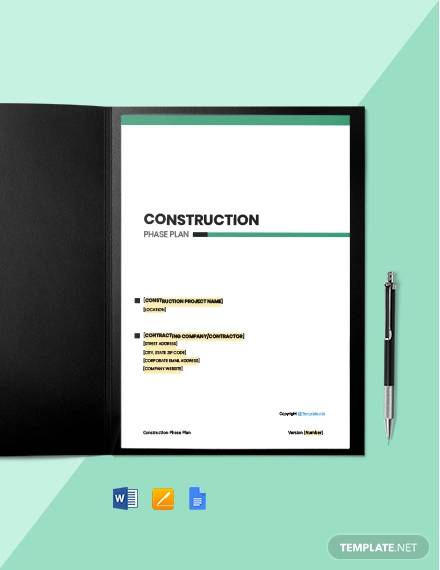
Free Sample Construction Phase Plan Template
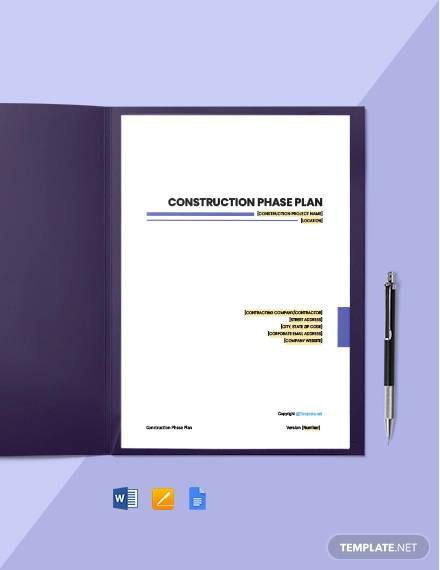
Free Simple Construction Phase Plan Template
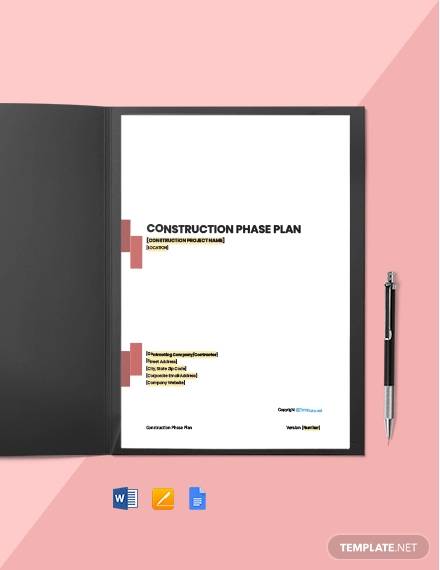
What Are Construction Phase Plans?
As disheartening as it is, the situation mentioned above is by no means a fairytale. Situations like those do happen in the construction industry. However, due to the severe consequences that come with such a loss, it’s no longer as frequent as it used to be. In fact, with the rise of the economy, infrastructure and real estate have gained quite a demand, so companies do their best to avoid being shut down for unethical work practices. Nowadays, many contractors, investors, and supervisors insist that a construction project proposal contain more than just statistics, but also a risk assessment or phase plan. But what exactly is a construction phase plan?
To fully grasp the concept of a construction phase plan, imagine a hazard analysis, a project management plan, and a field report rolled into one and then submitted annually to supply raw data and constant progress updates. This plan takes information and peculiars found on the construction site, analyzes all possible risks and threats present throughout the project, and then incorporates them into a structured plan.
“Phase” The Truth
The truth about construction is that workers put themselves at risk every day. These life-threatening scenarios range from the blatantly obvious such as anvils, cement mixers, and heights, to the more discrete killers like faulty wires, flammable materials, and gas leakage. In fact, during December of 1970, President Richard Nixon signed the Occupation Safety and Health Act (or OSHA for short). This Act dictated the work ethics of construction, which provided employees with more security on the job through information and safety measures.
Today, there are now fewer cases of significant construction accidents and lower mortality rates ever since the implementation of phase plans. This not only benefits the workforce but management as well for numerous reasons. If your company is known for its fantastic infrastructures, quality work, and happy staff, people are more likely to use your services, which then translate into more profits. Implementing and enforcing safety protocols also lessens the possibility of horrible delays, inability to deliver on the deadline, and lost revenue. As such, utilizing a construction phase plan may cost you a bit more time and cash at first, but the pay off is well worth it.
Construction Phase Plan Samples
It doesn’t take much to create a construction phase plan because all you need is a writer’s intuition, a word-editing software, and help from these sample templates.
1. Construction Phase Plan Sample
2. Construction Phase Plan Template
3. Health and Safety Construction Phase Plan Sample
4. Construction Phase Plan in PDF
5. Construction Phase Plan Example
6. Basic Construction Phase Plan Sample
7. Formal Construction Phase Plan Template
8. Simple Construction Phase Plan Template
9. General Construction Phase Plan Sample
10. Standard Construction Phase Plan Template
11. Construction Phase Plan in DOC
How to Create a Construction Phase Plan
Creating a construction phase plan is essential to beginning your infrastructure project. In fact, according to the law, you can’t even start building until you have a plan ready. However, writing one isn’t as easy as slapping on words together and taping them up like a broken chair, it takes a bit more than that, unfortunately. As such, to provide you with the necessary tools you need to construct your own document, here are some drafting tips to help you out.
1. Keep a Checklist of the Basics
What you want to make sure, first and foremost, is that you’ve established the basics. Understand the fact that this is still a document that takes precious time to draft, write, and create. Save as much time as possible by creating a content checklist of everything you need to be written down, such as essential sections of the report, field particulars, and other parts that you decide are relevant. Writing a checklist before drafting provides you a reference and skeletal outline of what you want to see, which then saves you time in the long run, and writing down what you need helps you remember it better.
2. Run a Field Report
What a construction phase report has up its sleeves is that its safety protocols and risk management aren’t just generic guidelines, but they’re site-specific. In other words, this type of program is tailor-made to fit the field of work available on your project. As such, you need to gather data outdoors and do a bit of dirty work, and the most efficient way of presenting this data is with a field report. Unlike other generic reports, this method specializes in investigating every nook and cranny at the construction site to determine where the hazards are and how they may affect the building process.
3. Assess Risks
Risk management doesn’t just involve tracking down possible threats. It also analyzes each one to find the best preventive measures and possible solutions should they occur. With that in mind, utilizing one for your construction phase plan allows you to conceive both a customized safety protocol for your site, and countermeasures should something slip through the cracks and all madness breaks loose.
4. Plan Accordingly
What’s the point of your gathered data if you don’t use it at all? You’re merely wasting time and effort by spending all those resources on the tips above, only to create a basic plan that most people are familiar with and don’t exactly need. Once you have all the information you need, create an action plan revolving around everything you learned. By using the most relevant data available to you, you increase safety and the likelihood of success and decrease the probability of disastrous consequences due to recklessness.
The construction site is the human-made embodiment of “The Butterfly Effect,” where a small misstep here, or an out-of-place wire there can lead to hundreds of dollars of damages, and maybe even more. Without a well-executed construction phase plan, you could well find yourself behind bars and crushed under the pressure of both guilt and lawsuits. Start your construction project right and ensure that safety always comes first—after all, a little gust of wind now could turn into a full-blown cyclone somewhere down the road.
Related Posts
FREE 3+ Sales Team Action Plan Samples in PDF | MS Word | Apple Pages | Google Docs
Marketing Plan For Small Business Samples
FREE 7+ Fashion Business Plan Samples in PDF
FREE 10+ Sprint Planning Samples In MS Word | Google Docs | PDF
FREE 10+ Wedding Planning Samples in MS Word | Apple Pages | Powerpoint | PDF
FREE 9+ Monthly Study Planner Samples in PSD | Illustrator | InDesign | PDF
FREE 9+ Sample Curriculum Planning Templates in PDF | MS Word
FREE 10+ Teacher Development Plan Samples in MS Word | Google Docs | Apple Pages | PDF
FREE 10+ Basketball Practice Plan Samples in PDF
FREE 12+ School Business Plan Samples in PDF | MS Word | Apple Pages | Google Docs
FREE 7+ Client Strategic Plan Samples in PDF | MS Word
FREE 11+ Trucking Business Plan Templates in PDF | MS Word | Google Docs | Pages
FREE 7+ Small Hotel Business Plan Samples PDF | MS Word | Apple Pages | Google Docs
FREE 14+ Bakery Business Plans in MS Word | PDF | Google Docs | Pages
FREE 4+ Yearly Lesson Plan Samples in PDF

